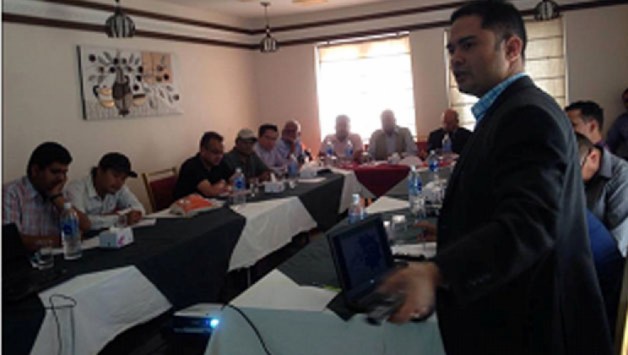
On Monday, 19 June, 2017, Kathmandu
- Programme facilitated by Former Minister Er. Ganesh Shah
- Coordinated by Mr. Guna Raj Dhakal, then Coordinator, RECC
- Guest Speaker: Mr. Balanand Paudel, former chairman of Restructuring Commission
- Speakers: Mr. Ram Prasad Dhital, Executive Director, AEPC
- Speaker: Mr. Nawa Raj Dhakal, Director, AEPC
- Speaker: Mr. Vishwa Bhushan Amatya, RE Expert Freelancer
- Managed by: Mr. Purna N. Ranjitkar
Introduction
Interaction and Discussion on Renewable Energy Movement in Federal Structure is a part of continued RECC efforts on knowledge and experience sharing and views and opinion building of professionals and practitioners involved in renewable energy promotion activities in Nepal. They are particularly dedicated in energy access to the people living in remote areas of mountain and hill districts and other accessible locations as well.
The previous such meeting on Renewable Energy in the Budget of Fiscal Year 2074-75 organised on June 03, 2017 had brought out a need of dealing on Renewable Energy Movement in Federal Structure. Likewise, the participants and the organisers felt necessity to deal in some similar aspects related to Renewable Energy Movement in the changed context as well.
Thus, with support of AEPC, RECC conducted this event to deal on the given subject matter in active presence of Mr. Balanand Paudel, the expert in the particular subject matter. Executive Director of AEPC Mr. Ram Prasad Dhital, Director of AEPC Mr. Nawa Raj Dhakal and RE Expert Mr. Vishwa Bhushan Amatya were also requested to highlight views and opinions.
Likewise, other experts expressed their valuable views in the context of renewable energy movement in the federal system as stated below.
Opening
Former Minister for Science & Technology and Environment Er. Ganesh Shah, as a facilitator, opened up the informal event with remarks on need of Interaction and Discussion on Renewable Energy Movement in Federal Structure. The stakeholders of the sector are looking forward to the pin point provisions of Renewable Energy Movement in Federal Structure in the Constitution of Nepal. He opined that Mr. Paudel and other speakers would throw lights on the matter so as the sector would receive right information on time. This will also to be prepared for the further performances and activities in the coming days for the professionals and practitioners.
Presentations and speeches
The Guest Speaker Mr. Balanand Paudel, who headed the state level commission constituted by the Government of Nepal to restructure provincial and local level units as per the provisions of the Constitution of Nepal 20172. Mr. Paudel has been much lauded for successful accomplishment of the historical task entrusted to him and his team.
Through a PowerPoint presentation, Mr. Paudel elaborated the norms and basics of three levels of governing bodies in the federal structure of country. They are the Federal Government, the Provincial Government and Local Level Government.
All three levels are equipped with optimum authorities and responsibilities. The central government will have to coordinate all seven provincial governments while 744 local bodies will be given extensive authorities and responsibilities. The local level assemblies are able to formulate laws and regulations based on their needs as well, he explained.
Renewable energy has been one aspect incorporated well in the federal structure. Interpretation on Renewable Energy has been mentioned in annexes of the Constitution of Nepal.
The amount of energy and financial involvement are some measures to be at part of the government at centre. Regarding renewable energy as alternative energy for the bottom level consumers, communities and institutions, the local level governments will handle this matter. The local level government will also be responsible to look after technical and financial aspects on such programmes.
The government has been committed to avail some influential technologies to provide to the bottom level consumers, communities and institutions through the entrusted agencies like AEPC and some other influential agencies which now the local governments have to take over to coordinate.
Aids and supports from various countries, donors and or development partners will be channelised thorough the government at centre. As such, provincial and local governments can receive fund through the government at centre.
The legal provisions are yet underway to frame out for the well performance of the different levels of governments.
Mr. Nawa Raj Dhakal, Director of AEPC said that AEPC is working out on a framework of renewable energy movement to carry out in the federal structure of the country. AECP will be functioning as a central unit where planning and programmes for all three level governments will be formulated and coordinate the movements in implementations. Seven authorities have been under consideration to be created to coordinate within each individual province. The framework which is still under designing phase will give wider rooms for different levels of governments to act in a harmonious manner so as Renewable Energy Movement will be considered to be in a similar shape, size and speed in the local levels. AEPC will also coordinate with the District Coordination Committees which will remain for some time in the action, Mr. Dhakal mentioned.
Mr. Dhakal also informed that AEPC will be working with GIZ, DFID, UNDP, KfW, World Bank, Asian Development Bank, UNDP and other similar agencies in different streams of renewable energy movement. In this, connection, DFID had pleaded a support of UK Pound 10 million to Nepal Government for the RE programmes to be conducted in coming few years.
Mr. Ram Prasad Dhital, Executive Director of AEPC, on the occasion elaborated the AEPC plans to act with the spirit of federal system in the country as provisioned by the Constitution of Nepal. As a regulating body in the centre AEPC will be acting as a regulating body. The fund available from domestic resources and foreign resources for the purpose of renewable energy promotion Central Rural Energy Fund (CREF) will be managed with better operational capabilities.
Opportunities and resources at certain geographical area of the local unit should be taken into consideration and appropriate renewable technologies to be applied to tap the opportunities. So as the earlier practices like District Energy Plan, the RE Subsidy Guidelines will still be relevant in implementing in the RE Movement in the federal system.
The sources of funds like Government under Pollution Control Fee, CDM and other external resources will be brought into the control of the centre while fund will be channelled appropriately through effective channels. CREF is functioning with the same mandate while involvement of other small but effective financing system may be introduced in collaborations with the local government. Thus, the AEPC at centre will have even effective functions to coordinate authorities in seven provinces and all local governments.
Mr. Vishwa Bhushan Amatya made a short remark on the subject matter. He said that clear views are still in the waiting so as the stakeholders and other concerned units and parties will take over the RE movement appropriately. As such, the RE sector has still more to explore so as working in the federal structure in the country to be smooth to take off.
Mr. Nabin Bhujel, Member at AEPC Board mentioned that the RE Movement must be focused to tap up standardisation of technology and equipments, R&D and piloting, quality assurance and monitoring as these are the basic aspects for RE Movement to take a speed as desired. Diversified norms and regulations will not be fruitful. Therefore, an effective system is need of the hour which helps local governments, provincial governments and the government at centre take reference to go ahead for the best of results.
Mr. Bhujel also added that knowledge on system design, operation and maintenance also will be better if imparted to the local level authorities.
Discussions
Mr. Gokul Gautam said that as the laws and by-laws are under formulating by this phase, a concerted effort to ask the concerned authorities to make it appropriately workable should be carried out. Therefore RE professionals and practitioners have to study well and lobby for necessary amendments without delay. Concerned lawmakers are needed to be influenced in this context, Mr. Gautam opined.
Dr. Brijesh Mainali, currently based in Stockholm, Sweden and involved in renewable energy activities suggested that the national standard should be formulated to be followed by all levels.
Mr. Shekhar Aryal, an RE entrepreneur stressed on harmonised frame work for the certain level is needful so as differences in functionalities should not take place. It also needs to be clear that how national budget will be delivered at local governments to act smoothly including RE movements.
Mr. Khimanand Kandel, General Secretary of WECAN and RE expert said that the Constitution mentions that planning to regulations will be carried out by local governments which may cause difference in modalities in different local governments. Therefore, capacity development to the local governments and provincial governments are needful in the present context so as harmonised functionalities will help easy performance to all stakeholders.
Representing NMB Bank Mr. Govind Ghimire said that clear policies and functional modalities have been a need for the banks to render desired services in renewable energy movement.
Mr. Batu Uprety said that the supply side now should be clear on the services and equipments to deliver to users/ communities/institutions where local governments will be influential in supporting the buyers. Thus, detail out on stakeholders' functions need to be defined now so as every stakeholder should be responsible at own part. Pilot programmes to carry out in key components at key locations may be fruitful in learning lessons to go ahead.
Dr. Indira Shakya, Mr. Neeraj Subedi, Mr. Manjeet Dhakal and Mr. Sahaj Man Shrestha also expressed their valuable views in the context of renewable energy movement in the federal system.
Conclusion
Outlined the rationale of Interaction and Discussion on Renewable Energy Movement in Federal Structure conducted by RECC, Mr. Guna Raj Dhakal, coordinator of RECC said that the interaction has been successful in sharing knowledge and exchanging views of the dedicated professionals and practitioners. He informed that RECC will follow up the find out at the soonest to fetch the best of the results. He also stated that similar event will be organised by RECC creating forum for the dedicated professionals and practitioners where the experts could contribute knowledge, experience and views for the cause of upliftment of people at even grass root levels through renewable energy promotion.
He thanked to Mr. Balanand Paudel, Mr. Ram Prasad Dhital, Mr. Nawa Raj Dhakal, AEPC, the participating RE professionals and practitioners and all.




